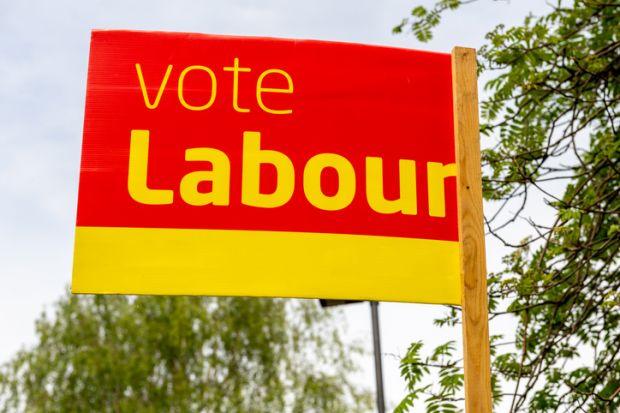Labour’s shadow higher education minister said addressing sustainable funding for universities was “a big ask” that has been “keeping him awake at night”, as two vice-chancellors backed the idea of a graduate tax.
Matt Western gave few clues about the direction of Labour’s discussions on higher education funding policy in England, and no indication that the party was nearing any conclusion to those discussions, during a brief appearance at the tail end of a fringe meeting at the party’s conference.
Party leader Sir Keir Starmer has previously announced that Labour was dropping its Corbyn-era policy to abolish tuition fees and fund universities through public spending – but he has not committed to a successor policy.
“The situation with fees is immensely challenging,” Mr Western told the event, hosted by Progressive Britain and Public First.
“The whole sustainability question around the sector is a big ask and a big challenge for all parties, whatever political colour.”
Mr Western said he has had conversations on funding “with all manner of people” about “what may happen”, including Conservative former secretaries of state and universities ministers “to get their perspectives on what they intended to do and what has happened” and “what has, perhaps, gone wrong”.
“It’s going to be a big ask going forwards,” he repeated.
The cost of living was a “massive issue” for students, Mr Western observed.
On sector funding, he added: “It’s very much keeping me awake at night just how we are going to square some particularly challenging questions.”
Charlie Jeffery, the University of York vice-chancellor, told the event that the status quo, under which the fee cap is frozen at £9,250 and rapidly being eroded by inflation, is “failing all of its stakeholders”.
Labour noise about boosting maintenance support for students is positive “but does nothing for university funding”, he said.
To make a case on funding, the sector would need to focus “much more strategically” on its role “providing skills for the future economy” and on its link with further education, he added.
Arooj Shah, Labour leader of Oldham Council, another member of the panel, backed the idea of a graduate tax as “fairer” and less of a deterrent for poorer students.
Jane Harrington, vice-chancellor of the University of Greenwich, one of the commissioners of newly released polling by Public First on public attitudes to higher education funding, said that among the public there was “no appetite to increase fees – we just have to recognise that”.
She backed the idea of a “tertiary strategy” uniting higher education and further education on a regional basis.
One interesting element of the polling, said Professor Harrington, “was that nuance around a graduate tax”.
“And I do think there’s something there, around a tertiary graduate tax, maybe more like National Insurance,” she added.
Professor Harrington said there should be “sensible conversations about where to go next”.
She added: “We are in danger of carrying on with a crisis that’s not sustainable and pretending it will be OK in the end – and it won’t.”
On a graduate tax, Professor Jeffery said: “The problem is the UK Treasury is against hypothecation of funding because it [the Treasury] is against long-term thinking.
“The solution there is to elect a government which might commit itself to long-term thinking.”
Andy Westwood, professor of government practice at the University of Manchester, a former adviser on universities in the last Labour government, said the Treasury opposed a graduate tax because it would entail a seven-year “valley of death” before funding started to flow from graduates.
It will “take some bridging to get there”, he added.
Professor Westwood told a separate fringe event, hosted by the Higher Education Policy Institute, that Labour should commit to a “broadly structured” review of tertiary education “that should be promised in the manifesto”.
The party’s aim should be shifting towards a joining up of higher education, further education and apprenticeships and away from a marketised system in which those elements are “so in competition with each other it’s crazy”, he said.
Register to continue
Why register?
- Registration is free and only takes a moment
- Once registered, you can read 3 articles a month
- Sign up for our newsletter
Subscribe
Or subscribe for unlimited access to:
- Unlimited access to news, views, insights & reviews
- Digital editions
- Digital access to THE’s university and college rankings analysis
Already registered or a current subscriber? Login







